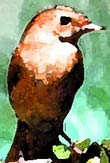Birds Cut Rivals Off in Mating Songs

Get the world’s most fascinating discoveries delivered straight to your inbox.
You are now subscribed
Your newsletter sign-up was successful
Want to add more newsletters?

Delivered Daily
Daily Newsletter
Sign up for the latest discoveries, groundbreaking research and fascinating breakthroughs that impact you and the wider world direct to your inbox.

Once a week
Life's Little Mysteries
Feed your curiosity with an exclusive mystery every week, solved with science and delivered direct to your inbox before it's seen anywhere else.

Once a week
How It Works
Sign up to our free science & technology newsletter for your weekly fix of fascinating articles, quick quizzes, amazing images, and more

Delivered daily
Space.com Newsletter
Breaking space news, the latest updates on rocket launches, skywatching events and more!

Once a month
Watch This Space
Sign up to our monthly entertainment newsletter to keep up with all our coverage of the latest sci-fi and space movies, tv shows, games and books.

Once a week
Night Sky This Week
Discover this week's must-see night sky events, moon phases, and stunning astrophotos. Sign up for our skywatching newsletter and explore the universe with us!
Join the club
Get full access to premium articles, exclusive features and a growing list of member rewards.
For male nightingales, the key to scoring with the ladies is to cut their opponents off.
Male songbirds often compete for mates through singing contests. The dominant ones usually start singing before an opponent finishes his song, signaling aggression that female birds sometimes find attractive.
[AUDIO: Hear the Birds Overlapping]
In a study of nightingales, scientists were interested to learn why 49 percent of the males didn't have a mate during breeding season.
"One possibility is that they select their future mate on the basis of the performance during a vocal interaction, because nightingales interact for hours during the night," said Hansjoerg Kunc, a researcher with University of Zurich, Switzerland.
A cappella test
Kunc and his colleagues played recordings of nightingale songs near the territories of males that were successful in finding a mate. And did the same thing with males that had no partners.
Get the world’s most fascinating discoveries delivered straight to your inbox.
They then counted the number of songs that each group interrupted or overlapped.
"Females pair with males that overlap more songs during a vocal interaction with a rival," Kunc told LiveScience in an email interview.
Female nightingales see song overlapping in a potential mate as a sign of aggression, an indication of other beneficial qualities. These males might be in better health and thus able to defend a territory better than males in poor condition, Kunc explained. And because aggressive males are more likely to have a mate, they also have a higher rate of reproductive success.
Other species
The nightingale is one species where song overlapping might play an important role, but black-capped chickadees, great tits, little blue penguins, and domestic canaries might also use this mechanism, Kunc said. "Furthermore, this phenomenon does not only occur in birds," but also in crickets, frogs and toads.
There is no clear evidence that this type of dominance rules when it comes to finding a mate in other species such as primates, the scientists say.
This study was detailed in a recent issue of the journal Animal Behavior.
- AUDIO: Hear the Birds Overlapping
- Men Act Like Dogs to Determine Dominance
- VIDEO: How a Songbird Sings
 Live Science Plus
Live Science Plus











